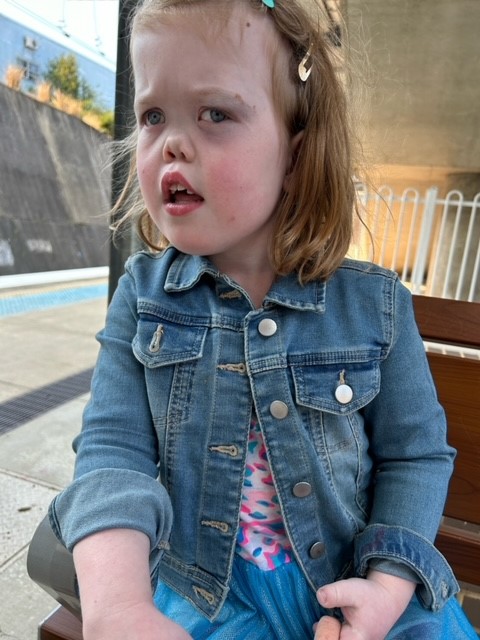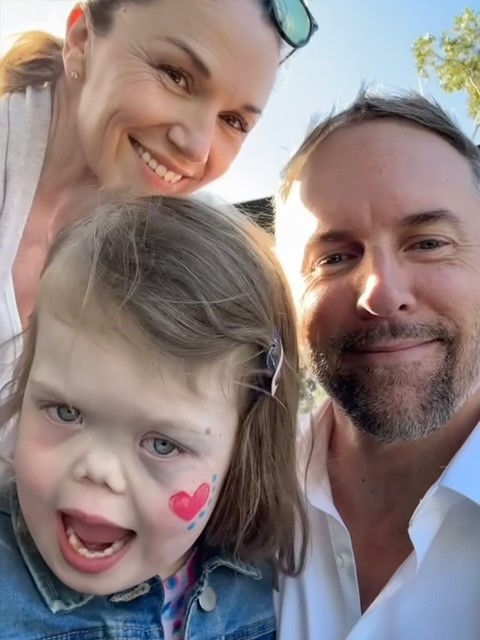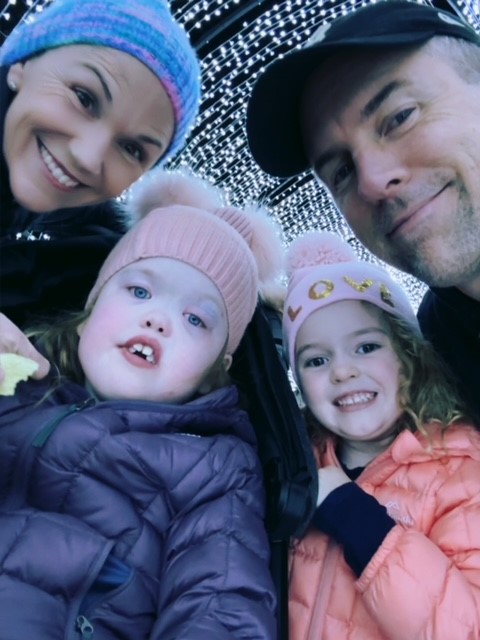Last Updated on September 16, 2023 by Kym Gleeson
Parenting a child with a rare genetic condition, and multiple complex neurodivergent challenges, can be an incredibly rewarding but also demanding experience. Each child is unique, and their specific needs and challenges may vary, but there are some common aspects. Here is my parenting journey on what it’s like being a special needs mum with our 8-year-old daughter Frankie.
Becoming Parents
Frankie is our first born. She was conceived by IVF and donor egg, so getting pregnant and having a baby was extremely challenging for us as a newlywed couple. When the fertility specialist confirmed we were expecting, we were so excited, and filled with love, joy, and hope. We felt that everything we had gone through had been so worth it, and we were having our much-wanted baby.
Frankie’s Diagnoses
Frankie was diagnosed with a rare genetic condition called Acrodysostosis Type 2 when she was 9 months of age. It was probably the worst day of my life. I can still hear the words fall out of the Genetics Specialist’s mouth like it was yesterday. I still become quite emotional when I think back on that day. I remember how confused and disorientated we were about Frankie’s future, not really understanding what this was and how it would impact her life.
Getting on and off the emotional rollercoaster of parenting a child with a rare genetic condition, and complex neurodivergent challenges can be emotionally intense. I experienced a wide range of emotions. From joy and pride in my child’s accomplishments, to frustration, sadness, and even guilt when faced with her struggles.
Connecting with Other Families
It all dramatically changed when my husband Michael started a Acrodysostosis Support Group on Facebook. Within the first week two families had found us, and in the weeks and months to follow, our page just kept connecting with other families on a journey like ours. Some had older children who could share valuable information and lived experiences to help us navigate Frankie’s early life and care.
I became an advocate and an expert on how to fight for her! I was navigating the healthcare system, and finding appropriate educational support, therapists, and clinicians. I was also applying for and navigating the NDIS and joining peer groups on social media. I was on my own journey now as a special needs parent.
Parenting Challenges
There was such a steep learning curve. The time required to invest in understanding Frankie’s specific condition and challenges is infinite. Particularly when your child’s needs grow and change due to the potential medical and physical conditions caused by their genetic diagnosis.
Parenting any child is tough. But when you are faced with developmental delays and complex neurodivergent challenges, it often requires exceptional patience and flexibility. You must adapt your parenting strategies frequently to meet your child’s evolving needs.
Frankie’s Therapies
Frankie requires various therapies, such as speech, occupational, behavioural, and physical therapy. She also requires specialised interventions, and that’s not including her medical specialist appointments. Frankie sees a group of specialist Doctors and Professors through the Sydney Children’s Hospital Craniofacial Unit, which includes neurology, genetics, dental, ophthalmology, endocrinology, plastics, and ENT. Balancing these appointments with daily life is extremely stressful for both of us.
This is where finding a supportive community of parents facing similar challenges can be invaluable. These parents can provide emotional support, practical advice, and a sense of belonging. They are a tribe of likeminded warrior mums that are there for you and your child that share the same lived experience as a care giver.
Celebrating Frankie
We celebrate every milestone and achievement for Frankie. She has her own social pages, and I post regularly about her life, helping her to drive awareness of rare disease and special needs. I hope one day she can look at it and read all the amazing comments of love and support, letting her know just how wonderful and amazing she is.
I also find writing on her behalf very cathartic and therapeutic as it reminds me of how far she has come and what an amazing team we really are!


Importance of Self-Care
It’s very easy on this journey (of being a special needs parent) to put myself last. But to be the best parent I can be, I know it’s essential to take care of myself. My advice to other special needs mums is to never neglect your physical and emotional well-being. Seeking respite care or asking for help when needed is extremely important.
Other Siblings
I also have Frankie’s younger neurotypical sister Georgia, (who is 5) to support. I need to support her as her mother, but also as the person helping her navigate her role as a sibling to an older sister with additional needs.
Some days I find this the hardest part and feel like I’m possibly failing one child to support the other. It’s very difficult to strike a balance.

3 Important Ways You Can Make a Difference
Everyone can play a part in supporting families with special needs children. The following are 3 powerful ways you can make a positive and impactful difference:
1. Inclusion and Acceptance:
Children with special needs have a fundamental right to be included in society! It’s essential for everyone to recognise and promote inclusion. Not only in schools but also in the broader community and social settings.
When given opportunities to interact with their peers, children with special needs can thrive and this promotes a more accepting society. All parents need to teach their children from a young age to always consider, accept and include children with special needs.
2. Respect and Empathy:
Parents play an important role in raising a compassionate future generation. Teaching (neurotypical) children to show respect towards children with special needs requires consistent communication and leading by example.
Young children are naturally curious and may not always understand the implications of their actions. This is where parents need to step in and teach empathy, explain differences and model respect at all times.
If you notice your child staring or laughing at someone with special needs, address the behaviour immediately, and explain why it’s important to never make others uncomfortable or hurt their feelings.
3. Education:
There are numerous websites, children’s books, movies, and TV shows that depict characters with special needs. These are a great way to initiate discussions with young children and reinforce the importance of respect and understanding.
My Final Message
Every child is unique, and there’s no one-size-fits-all approach to parenting in this situation. I always try to be patient with myself and seek help and guidance from professionals and support networks when necessary.
While my journey as a special needs mum is challenging, the love and bond between Frankie and myself is deep and rewarding. It’s also my constant source of strength throughout my parenting journey.
The Frankie Foundation
If you would like to help a family support their child and bridge their gap in the NDIS, please
Donate to The Frankie Foundation Today! Every Donation Counts!
While you’re here, don’t forget to subscribe to Little Girl Shining. You’ll be joining a group of mums with one special thing in common… we all have little girls! x

